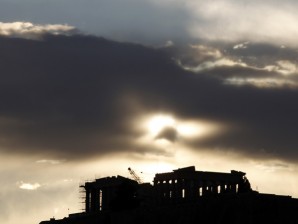
The temple of Parthenon is silhouetted against a cloudy sunset atop the Acropolis hill in Athens, on May 17 2012. Fitch ratings agency has downgraded debt-crippled Greece deeper into junk territory, warning of a "probable" Greek exit from the euro currency union if new national elections next month produce an anti-bailout government. Fitch said it had cut Greece's rating by one notch, from B- to CCC, the lowest possible grade for a country that is not in default. AP/KOSTAS TSIRONIS
ATHENS – Europeans are avoiding vacations to Greece this summer fearing instability sparked by the debt crisis, industry sources said, inflicting a hard blow to the country’s already devastated economy.
“From the aftermath of the elections on May 6, we have experienced a 50 percent drop in bookings,” said George Drakopoulos, director general of the association of Greek tourism enterprises (SETE).
Though tourism from Germany this year is back on the rise, overall booking numbers are still plummeting ahead of the busy summer season, Drakopoulos said.
“Hotels make appealing offers, but that is not the issue here. For many of the tourists visiting Greece, it is a matter of security on top of value for money.”
This comes after a particularly profitable 2011 season, where Greece benefited from the unrest in the northern Africa.
According to SETE, tourism represents 15.7 percent of Greece’s output and employs 768,000 people, either directly and indirectly.
Panagiotis Moriatis, president of the association of hotel owners of Nafplion – a highly popular tourist destination close to the Bronze Age site of Mycenae – said business this year should drop by up to 15 percent.
Moriatis blamed bad publicity: “Foreign media only portray the troubles in Athens and show nothing of the rest of Greece, where conditions are the exact opposite.”
“Athens is the city that has suffered the greatest damage. Fewer tourists visit Athens and this takes its toll on other cities,” Moriatis added.
Germans in particular are thought to be avoiding Greece in fear of retribution by angry locals for two years of austerity measures many Greeks link to Germany’s Chancellor Angela Merkel.
“Last year we had a 10 percent rise in German tourists. This year we have a 25 to 30-percent drop. German tourists are afraid that they are in danger if they visit Greece,” said SETE’s Drakopoulos.
But Sybille Zeuch of the German Travel Association (DRV) said that, despite a lukewarm start in early 2012, bookings are on the rise over the past few weeks.
“Many [German tourists] are regulars and they know that islands are not affected [by events taking place in Athens],” she said
Zeuch added that at this pace, there is a good chance that the number of German tourists visiting Greece will not greatly vary from that of 2011, with 2.5 million visits.
“Greece has never been more attractive as a holiday destination,” said Anja Braun, spokesperson of TUI Germany, because of lower prices.
For TUI’s German travelers, Greece is the third most popular holiday destination, after Spain and Turkey.
Similar assurances come from Italy and Austria.
Roberto Corbella, head of the association of Italian tour operators (ASTOI) said that at the end of the season the level of bookings for Greece should be “similar to last year’s.”
Corbella said Italians are not afraid to visit Greece, as problems are centered in Athens and the majority of Italian tourists travel directly to Greek islands with charter flights.
TUI Austria has fewer requests for bookings and trips for Greece compared to last year, but the company has not reduced flights to Greece, said company spokesperson Josef Peterleithner.
John Kester, an industry trend observer of the Madrid-based United Nations World Tourism Organization (UNWTO) said Greece has its “loyal followers, people who know the country first-hand, and that audience stays loyal” and is not influenced by media coverage.
“Emerging tourism markets are much more vulnerable to negative news,” Kester insisted.
But the French are reticent to vacation in Greece, experts said.
“We are facing a 30 percent drop in summer bookings compared to last year. There is a psychological impact … that is certain,” said Rene-Marc Chikli, head of the association of French tour operators (CETO).
Chikli added that operators are also bracing for the end of the euro, an event that would force emergency contract negotiations with hotel owners.